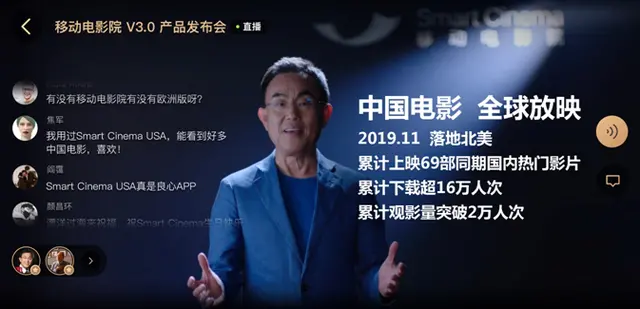During the COVID-19 pandemic, Chinese movies have still managed to make their way out into the world and onto smartphones overseas, according to Smart Cinema CEO Jack Gao.
The former Dalian Wanda Group executive announced the news during a virtual press conference to launch Smart Cinema V3.0 before the online premiere of the movie The Kid from the Big Apple, which was broadcast live to more than 2 million people worldwide.
Smart Cinema, a mobile and virtual cinema app, turns people's smartphones into movie screens. It adopts all the operational framework of traditional movie theaters, from ticketing, one-time screening, revenue that counts towards real movie box-office earnings, and exhibiting new films currently under theatrical release.
Since Gao launched the project in May 2018, the app has been looking to disrupt the 125-year history of motion picture development and explore incremental potential for the Chinese market.
According to the latest statistics, Smart Cinema now has more than 5 million users and has screened almost 400 theatrical releases. In particular, between May 2019 and May 2020, nearly 250 theatrical releases debuted on the app, taking in over 100 million yuan ($14.1 million) in box office revenue, a year-on-year increase of over 100%.
Since the beginning of this year, the devastating COVID-19 pandemic has offered the environment for Smart Cinema as movie theaters around the world have been forced to close their doors.
As a longtime industry veteran, I can firmly tell you, after the pandemic, the cinema and film industry box office model will still stand, but changes will also come, said Gao.
Since the app makes it possible to choose when and where to watch movies, people can now ask friends to join them for a particular movie, during which they can chat and post comments online, rather than sit silently in a theater.
With his previous experience in the film industry, Gao still laments the lack of any large distribution channels for Chinese films in theaters overseas as Hollywood has dominated the market.
Since officially launching the North America version last November, a total of 69 Chinese blockbusters including Ne Zha, Better Days and Dying to Survive have screened to virtual audiences in the U.S. — equivalent to 700 screenings in traditional theaters.
The Chinese film industry took a significant hit this year, with 5,328 film and television companies either closing down or suspending operations since the beginning of 2020. At present, China’s National Film Administration estimates box-office total losses this year of around 30 billion yuan.
Some Chinese filmmakers have tried innovative new ways to survive and limit their losses. Director and actor Xu Zheng sold the rights for his latest comedy Lost in Russia to digital giant Bytedance who screened the movie for free on their various video platforms. Having attracted 600 million views online, it has however been viewed as a betrayal by many brick-and-mortar theaters and led to some protests.
For Gao, the online release of Lost in Russia was a one-off caused by unique circumstances, rather than a sustainable business model. However, he accepts that the event did educate both the market and the people, who now realize that watching new movies is not limited to theaters.
Jack Gao believes the integration of online and offline cinemas marks a general trend for the future. He is also buoyant about the role movies can play in easing people's epidemic-induced anxiety, stating, This is the most obvious feature and role of Smart Cinema — as a supplement to physical cinemas.
He continued, Smart Cinema is actually a guardian of the industry. We look forward to working with physical cinemas worldwide to provide them with technical support and platforms, giving them a full range of both online and offline screening abilities.
 简体中文
简体中文










